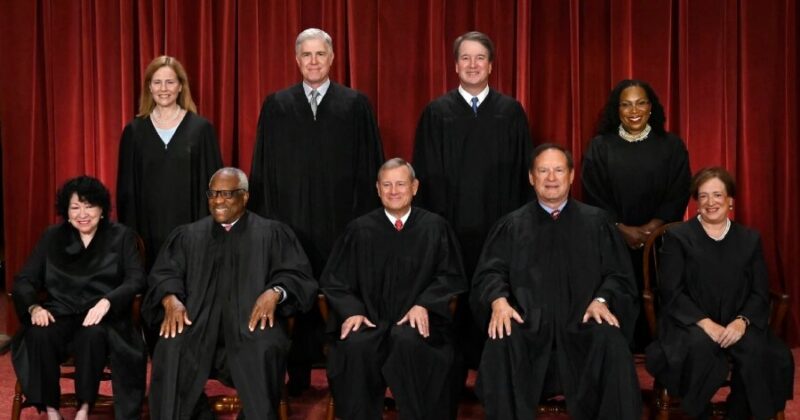On June 6, the Supreme Court delivered a unanimous ruling in favor of the IRS regarding a dispute concerning the taxation of shareholders’ life insurance policies.
Justice Clarence Thomas authored the court’s 9-0 decision in the case of Connelly v. Internal Revenue Service.
The case revolves around a closely held corporation owned by two brothers. Following the death of one brother, disagreements arose between tax authorities and the estate regarding the valuation of the stock.
Closely held corporations frequently establish agreements stipulating the redemption of a shareholder’s stock upon the shareholder’s death, aiming to maintain the closely held structure of the business. In these typical estate-planning arrangements, corporations acquire life insurance policies on the shareholder to ensure that the transaction is adequately funded.
The Supreme Court ruled that life insurance proceeds that will be used to redeem a decedent’s shares must be included when calculating the value of those shares for purposes of the federal estate tax.
The U.S. Court of Appeals for the Eighth Circuit dismissed the appeal filed by Thomas Connelly, executor of Michael Connelly’s estate, in June 2023.
The IRS claimed that the estate owed nearly $1 million in taxes. This assessment arose when the agency discovered that Crown C Corp., a St. Louis-based building materials business, had neglected to report life insurance proceeds following Michael Connelly’s death in 2013.
Michael Connelly, who served as president and CEO of the corporation until his passing, held 77.18 percent of the company’s shares, while Thomas Connelly owned the remaining 22.82 percent.
The executor submitted an estate tax return, declaring the value of his brother’s shares as $3 million. However, the IRS conducted an audit during which an accounting firm assessed the shares at over $3.8 million at the time of the brother’s passing.
The IRS concluded that the life insurance proceeds had to be factored into the valuation of the corporation, resulting in a company valuation of $6.8 million at the time of death. Consequently, the IRS determined that the estate owed an additional $890,000. The estate paid the sum and subsequently filed a lawsuit against the tax agency in federal court in Missouri.
The Supreme Court examined whether a life insurance policy acquired to fund the company’s repurchase of the deceased co-owner’s shares should be considered in the valuation of the stock.
The estate contended that the stock should not be subjected to taxation since the proceeds were designated for the repurchase of outstanding shares. In contrast, the IRS maintained that the shares were taxable based on their fair market value, assessed by their potential sale value at the time of the co-owner’s death.
According to the petition filed by the surviving brother, the case revolves around a crucial issue of federal tax law where there is disagreement among the federal courts of appeal.
As per the Internal Revenue Code, when an individual passes away, their estate becomes liable for federal estate tax, determined by the fair market value of the estate’s assets at the time of death.
“In many cases, fair market value can be determined through a straightforward analysis of public markets. But when a particular type of asset is not freely traded, fair market value must be determined on the basis of assessment and evaluation,” the petition states.
“Under applicable Treasury regulations, life-insurance proceeds payable to a corporation may be relevant to determining the value of a decedent’s stock in the corporation in some circumstances but not others.”
“The question presented is whether the proceeds of a life insurance policy taken out by a closely held corporation on a shareholder in order to facilitate the redemption of the shareholder’s stock should be considered a corporate asset when calculating the value of the shareholder’s shares for purposes of the federal estate tax.”
In his recent opinion, Justice Thomas detailed that the Connelly brothers had made an agreement to ensure the company remained within the family in the event of either brother’s death. As part of this agreement, the corporation could be obligated to buy the shares of the deceased brother.
To fund the potential redemption of shares, the corporation secured life insurance policies on each brother. Following the death of Michael Connelly, a disagreement arose regarding the valuation of his shares for estate tax purposes.
“The central question is whether the corporation’s obligation to redeem Michael’s shares was a liability that decreased the value of those shares,” Justice Thomas wrote. “We conclude that it was not and therefore affirm [the decision of the Eighth Circuit].”
The justice clarified that at the time of Michael Connelly’s passing, the corporation was valued at nearly $4 million, and his family assessed his shares at around $3 million. However, the tax agency maintained that the corporation’s value was closer to $7 million due to the $3 million in insurance proceeds. Consequently, the shares of the deceased were appraised at slightly over $5 million.
“Because a fair-market-value redemption has no effect on any shareholder’s economic interest, no willing buyer purchasing Michael’s shares would have treated Crown’s obligation to redeem Michael’s shares at fair market value as a factor that reduced the value of those shares,” Justice Thomas wrote.
The justice wrote: “Redemption obligations are not necessarily liabilities that reduce a corporation’s value for purposes of the federal estate tax.”
Share your thoughts by scrolling down to leave a comment.

